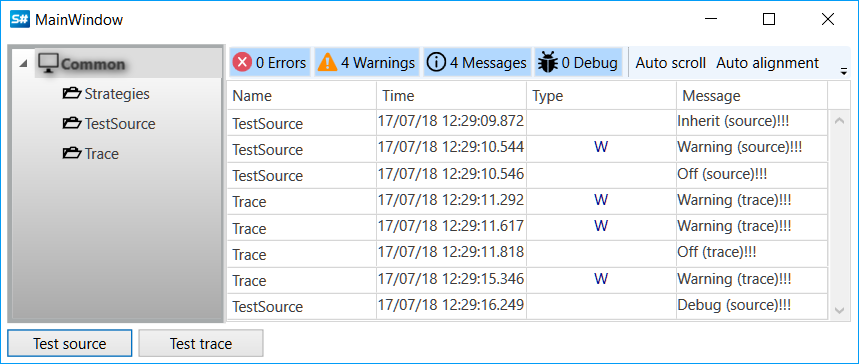Other logs sources
In previous topics, objects embedded in the S# classes were sources of logs. The S# provides possibilities for cases when the source of the logs is your own class, or when the source does not have to be associated with a particular class but serves the entire application. For the first case you must implement in your class the ILogSource interface or inherit from the BaseLogReceiver. In the second situation, you can use the TraceSource, which uses the .NET tracing system. How to do this is shown in the Samples/Common/SampleLogging sample.
SampleLogging sample
Create a custom class that inherits from the BaseLogReceiver.
private class TestSource : BaseLogReceiver { }Create the LogManager and declare a variable of the user class.
private readonly LogManager _logManager = new LogManager(); private readonly TestSource _testSource;Add log sources.
_logManager.Sources.Add(_testSource = new TestSource()); _logManager.Sources.Add(new Ecng.Logging.TraceSource());Add log listeners.
// log messages will be displayed in GUI component _logManager.Listeners.Add(new GuiLogListener(Monitor)); // also writing in files _logManager.Listeners.Add(new FileLogListener { FileName = "logs", });Add messages of the custom class logging. The level of logging is chosen randomly.
var level = RandomGen.GetEnum<LogLevels>(); switch (level) { case LogLevels.Inherit: case LogLevels.Debug: case LogLevels.Info: case LogLevels.Off: _testSource.AddInfoLog("{0} (source)!!!".Put(level)); break; case LogLevels.Warning: _testSource.AddWarningLog("Warning (source)!!!"); break; case LogLevels.Error: _testSource.AddErrorLog("Error (source)!!!"); break; default: throw new ArgumentOutOfRangeException(); }Add tracing messages.
var level = RandomGen.GetEnum<LogLevels>(); switch (level) { case LogLevels.Inherit: case LogLevels.Debug: case LogLevels.Info: case LogLevels.Off: Trace.TraceInformation("{0} (trace)!!!".Put(level)); break; case LogLevels.Warning: Trace.TraceWarning("Warning (trace)!!!"); break; case LogLevels.Error: Trace.TraceError("Error (trace)!!!"); break; default: throw new ArgumentOutOfRangeException(); }The result of the example work.
